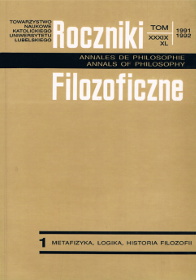The Role of Non-classical Logics in Justifying Theses in Philosophy
Abstract
In order to present the role and significance of non-classical logics in justifying philosophical statements in the first part of the paper much attention had to be devoted to the important problemof justifying theses. An attempt is also made there at showing − however briefly − the contents and scope of the term „non-classical logic”.
Point two of the article is devoted to a consideration of the relations between real knowledge understood in an instrumentalistic way and systems of non-classical logic understood likewise. In the circle of people proclaiming themselves in favour of real knowledge and formal logic treated in an instrumentalistic way one can hardly speak about indirect justification of statements formulated according to the spirit of K. Ajdukiewicz’s findings.
Analyses contained in point there of the article are devoted to manifold characterization of various systems of non-classical logic. Multivalent logic is characterized. Much attention is devoted to a philosophical characterization of intuitionistic logic. This latter system of non--classical logic is shown as one that supplies control tools for testing correctness of indirect justifications that can be based on subject-oriented philosophy. Various problems are discussed which are connected with constructing new systems of non-classical logics which are extensions of the classical logical calculus, which systems may be used with good result in indirect justification of theses on the ground of broadly understood ontologically, metaphysically oriented philosophy.
Copyright (c) 1992 Roczniki Filozoficzne

This work is licensed under a Creative Commons Attribution-NonCommercial-NoDerivatives 4.0 International License.





